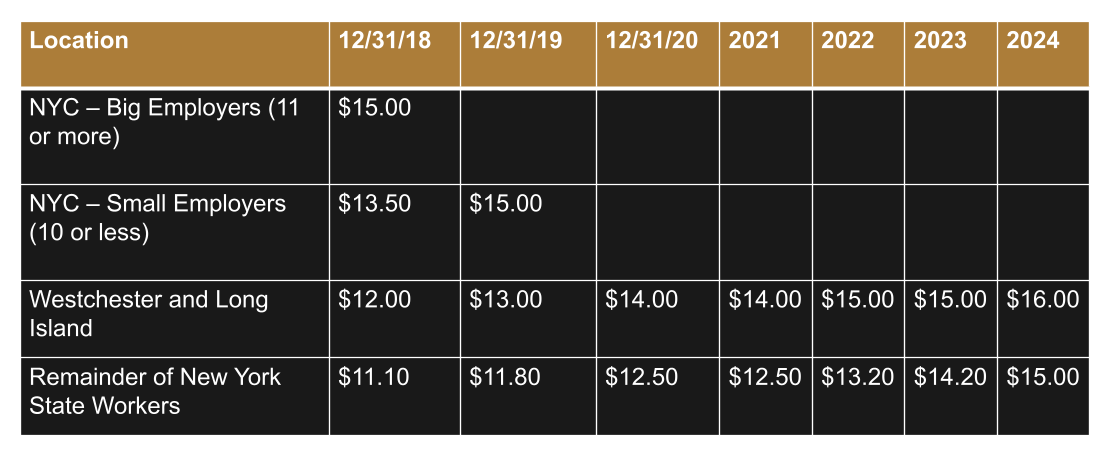Unpaid Wages
We represent employees in all industries in cases regarding unpaid wages due to violations of federal law via the Fair Labor Standards Act (FLSA) and applicable state labor laws. These laws protect employees and ensure that they receive the wages they are entitled to receive.
At Frontera Law we have significant experience resolving wage and hour matters on individual, collective, and class action bases in various different venues, as well as in pre-litigation negotiations. In particular, we have extensive experience representing clients in the restaurant, construction, and domestic worker arenas.
Common wage payment violations include the following:
The FLSA requires employers to pay employees at least the statutory minimum wage, which varies from state to state. Currently, in New York City, Westchester, and Long Island, the minimum wage is $16 an hour. In the rest of New York State, the minimum wage is $15 per hour.
If an employee is paid on an hourly basis and works more than 40 hours per week, the employee should be paid overtime wages at one and one-half (1 ½) times the employee’s regular wage rate for each hour worked over 40 (or hours over 44 if the employee is a domestic worker living in employer’s residence within New York State). Employees who do not receive proper overtime pay may be entitled to substantial monetary damages.
Employers may not deduct hours from a worker’s pay if the worker did in fact work those hours. This practice is known as “time shaving.” Employers often pay workers based on their pre-written schedule of hours, not based on the actual hours that the employee worked each day. Employees are entitled to be paid for all the time they spend working and the pay should be aligned with the actual start and end times of the workday, not just what was written on the schedule. If someone works longer than initially scheduled, they are owed pay for that additional time.
In New York, hospitality workers and most minimum wage employees working shifts that spread over ten hours per day are entitled to “spread of hours” pay, which is one additional hour of pay at the minimum wage rate.
- An employer may misclassify an employee as an exempt employee or independent contractor. The misclassification may or may not be intentional. Regardless of the motivations of the employer, misclassifying someone in one of these ways means that the worker will not receive overtime pay and/or various other employment benefits.
- Determining if someone is an independent contractor or not requires a very fact-specific analysis and courts use a variety of factors to make the determination. The lawyers at Frontera Law have experience with these analyses and will carefully consider each individual situation to see if there is a misclassification claim, or not.
- If an employer classifies a worker as an exempt employee the worker gets paid a fixed salary, instead of an hourly wage. The FLSA only allows for employees in certain job positions to be exempt from overtime pay. Most employees should be paid hourly; exemptions from overtime pay are often incorrect. Specifically, there are “white collar exemptions” for employees who are paid a certain minimum salary amount and whose job duties pass the federal tests that exist for executive, administrative, professional, computer, and outside sales positions. There are also some industry exemptions (e.g. agricultural and motor carrier workers).
- If workers do not fit into the above exemptions, they are likely entitled to overtime pay.
New York Labor Law requires hourly “manual workers’ to be paid weekly, within seven calendar days at the end of the week in which their wages were earned. Unless the employer applies for and is granted an exemption, workers may be entitled to damages for late payment of wages.
A “manual worker” spends more than 25% of their working time performing physical labor. Physical labor includes: lifting, carrying, organizing shelves, cooking, cleaning, etc.
If an employee earns tips at work, the employer may be permitted to pay that person less than the full minimum wage per hour. In New York, employer tip credit amounts differ from industry to industry and from occupation to occupation. For example, in New York City service workers may be paid $10.00 per hour instead of the full minimum wage of $15.00. However, in order to take advantage of the tip credit and legally pay the worker the subminimum wage amount, employers must comply with several specific requirements. For example, employers must give employees advance notice about the tip credit and the employee cannot spend more than 20% of the workday performing un-tipped work. Also, employers may require tip sharing and tip pooling with other tipped workers but it is unlawful to require the sharing of tips with managers, employers, or non-tipped workers (e.g. kitchen staff who do not interact with customers).
Request A Free Consultation
Frequently Asked
Questions
No. It is prohibited under the federal and state law for an employee to voluntarily waive his or her right to be paid overtime for hours worked over 40 in a workweek.
It is not required under federal law for an employee to be paid overtime for working holidays. However, some workers have employment contracts which provide for additional payment during holidays.
Maybe. Salaried employees can be exempted from receiving overtime wages if they make a specific amount per week, as required by state and federal law. The minimum salary threshold varies based on where one lives and works. In New York City, Long Island and Westchester, the minimum salary for exempt workers is currently $58,500 per year. In addition to the minimum salary threshold, salaried employees need to be working in particular exempted job positions. For example, executives, managers, computer programmers, and accountants are all employees that are exempt from overtime pay as long as they are receiving a sufficient salary payment. However, sometimes workers are misclassified and given exempt employee job titles that do not match the work that they do. In those cases, the employees may be eligible for overtime pay.
No. Federal Law prohibits employers from keeping any tips and from including managers or supervisors in the tip pool or tip share.
Only employees whose work is personally serving customers are eligible to receive a share of the tips that are collected. These include: wait staff, counter personnel who serve food or beverages to customers, bus persons, bartenders, service bartenders, barbacks, food runners, captains who provide direct food service to customers, and hosts who greet and seat guests.
Every case is different. Some cases are resolved within a few months, others can take years to be resolved. You can discuss potential timelines with your attorney to get a better sense of how long it might take for your matter to be resolved.
New York’s Labor law allows employees to file claims for wage and hour violations for up to six (6) years after violations. However, federal law only goes back three (3) years.
It is against federal and state law for an employer to retaliate against an employee for complaining about labor law violations and additional claims can be brought against the employer for doing so.
No. Managers and supervisors are prohibited from retaining tips that are left for tipped employees. Managers and supervisors are only permitted to retain tips that they receive directly from customers based on the service they directly and solely provided.
No. Tips are not considered part of your regular rate of pay when doing overtime calculations.
Overtime is calculated by multiplying your hourly pay rate by 1.5 and multiplying that number by the total overtime hours worked.


